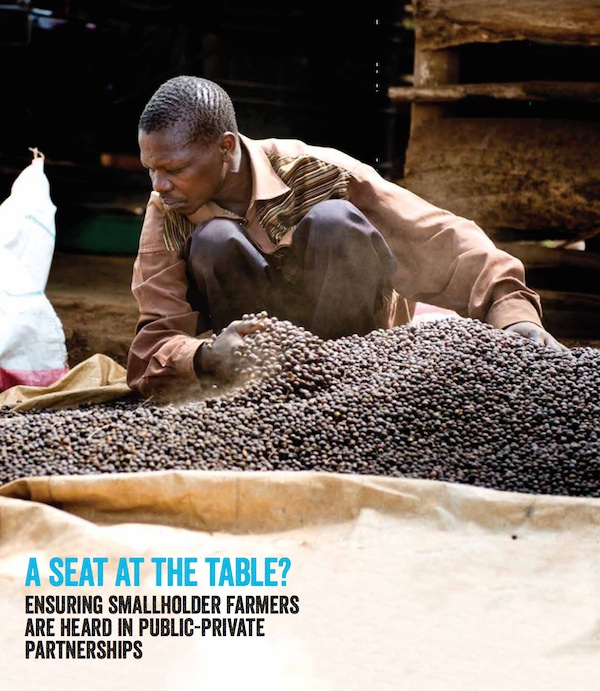Smallholder farmers have been under-represented or ignored in public-private partnerships (PPPs), causing some PPPs to further aggravate the social and economic disparities they were intended to address, according to a new report from the UK-based Fairtrade Foundation. The report also sheds new light on the ongoing situation in Nyeri, Kenya, where a PPP led to a controversial centralized milling plan last year.
The British wing of FLO International, the Foundation conducted interviews and research on PPPs involving three separate agricultural subsectors in Africa over the past two years, including a coffee climate change adaptation PPP and a centralized coffee milling PPP, both in Kenya. The group says both coffee PPPs failed to give the smallholders involved adequate representation during development and implementation of the partnerships, resulting in limited positive change. In some cases, as with the central milling plan in Nyeri, Kenya, the PPPs actually caused additional economic hardship to the very smallholders they were purporting to assist, according to anecdotal evidence cited in the report.
(related: Five Strategies from Five Coffee Luminaries on How to Keep Smallholders Viable)
To be clear, this is not just a coffee issue. The Foundation came up with similar findings for other agricultural product-related PPPs in Ghana and Malawi. In short, the organization said, “Overall, ways and mechanisms to engage smallholders in the design of agricultural PPPs in Africa appear to be weak.” The occasional result, the Foundation said, is “partnerships that miss or ignore smallholder farmers’ priorities; or in the worst case scenario, actually aggravate local social and economic disparities and inequalities and exacerbate poverty.”
In context, the report underscores a sentiment we’ve heard repeatedly over the past couple years: Traditional top-down approaches to development programs at origin — whether led by governments, third-party certifiers, NGOs, or even on individual project levels — consistently fail to effect real change without a significant voice from smallholders. (See Fair Trade USA’s “Fair Trade For All” initiative, a direct response to this idea.)
(related: Column: Independent Smallholder Farmers are the Silent Majority)
The Foundation says it was this kind of top-down approach that mostly failed in Nyeri, where last year the county government led a centralized milling plan in partnership with Kenya Co-operative Coffee Millers Ltd (KCCM), a wholly owned subsidiary of Kenya Co-operative Coffee Exporters Ltd (KCCE). Historically, Nyeri is known to produce some of the world’s finest coffees, and many influential coffee buyers spoke out about the government interference in milling and processing last year, citing worries they would not be able to trade directly with societies which which they’d established previous relationships.
Related
Nyeri is Just the Beginning: Some Clarification on the Controversy in Kenya
Farmers in Renowned Kenyan Region Nyeri Fight Government Centralization Plan
Government-Appointed Watchdog Group to Look Into Kenya Coffee Sector
KCCM was tasked with centrally milling and marketing all of Nyeri’s coffee, essentially shutting down other privately-owned Nyeri mills and limiting operations of individual coffee societies. We covered the controversy in Nyeri extensively last year, and Nyeri agricultural officials told Daily Coffee News in April that the central milling and marketing would be a one-year solution to help boost the industry and maximize returns to individual societies and smallholders. They said it was a response to collusion over a period of years among some exporters and marketers operating in Nyeri.
The Nyeri PPP resulted criminal lawsuits against some coffee societies and private mills who refused to deliver their coffee to the central mill for a fixed price, claiming they’d already negotiated for higher prices through the free market.
The Fairtrade Foundation suggests the PPP, by taking a top-down approach, was doomed from the beginning:
The actual decision to create a partnership between Nyeri and KCCM to mill all of the county’s coffee was taken at a political level by the governor and approved by the county legislative body. In this sense, farmers were not part of the actual decision-making process, and the new arrangement was issued to coffee societies as a directive.
(related: Farmworkers: The Coffee Industry’s Ethical Blight and a PR Disaster in Waiting)
Despite the criticisms of the Nyeri plan over the past year, the Fairtrade Foundation report suggests that the PPP was indeed responding to some genuine concerns among smallholders relating to market availability. Some smallholders interviewed said the current system was so broken that any change was essentially good change (it’s worth noting that the smallholders interviewed in Nyeri were all representing Fairtrade-certified farms). That said, the directive nature of the PPP and the lack of consideration of the concerns of many smallholders and smaller private millers created confusion, prevented transparency, and led, in general, to a contentious situation that may have worked against many smallholders:
Coffee farmers interviewed for this study expressed mixed views about the Nyeri government’s initiative. Given the opportunity to engage fully in the PPP, the farmers would have raised their major concern of lack of transparency in the supply chain. At a group discussion with the interim board of directors and members of the Gikanda Farmers’ Cooperative Society, a Fairtrade certified organisation, farmers complained they lacked information about what was happening to their coffee after they had delivered it to the KPCU mill at Sangana. While the members of Gikanda did not want to go back to the previous system, they hoped to push the county government to enact new rules to make the negotiation of coffee prices more transparent, and to provide them with greater predictability of income. They also thought the county government could help them find direct buyers of their coffee.114 One member also noted that while they would have to wait and see how the new system worked out, one positive effect was that the governor’s move would force private companies to change their behaviour in terms of how they buy their coffee.
Nick Brown
Nick Brown is the editor of Daily Coffee News by Roast Magazine.







Comment